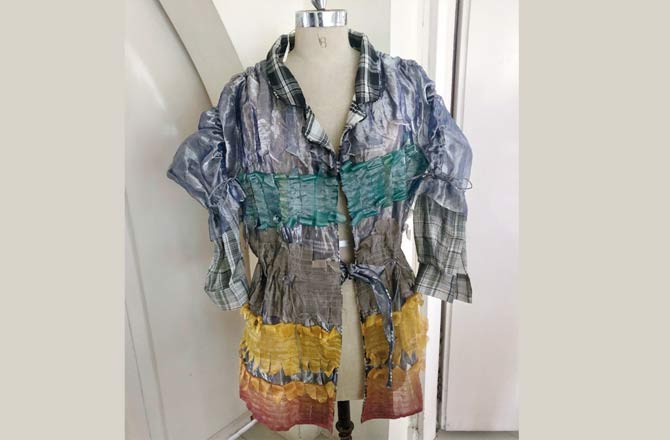Full-time fashion consultant and stylist, and part-time designer, Nikhil D's new collection called Fawn, is 100 per cent dumped and discarded item-centric

Nikhil D's collection thrives on fabric waste and garments that failed quality check. Pic/Shadab Kha
At his modest Juhu apartment, Nikhil D is busy converting failures into winners. A pero dress by Aneeth Arora that has failed a quality check (QC) on account of a stain is re-imagined by deconstructing it into a dress and a short jacket. And in this manner, the 31-year-old is quietly tackling global concerns of textile waste, with a collection of 50-odd garments created entirely from leftover fabrics and failed QC items sourced from Rina Singh of Eka, Ruchika Sachdeva of Bodice, Gaurav Jai Gupta of Akaaro, Nimish Shah and Arora.
ADVERTISEMENT
It was back in February last year that Nikhil wrote to this group, whose work he personally relates to, to donate leftover fabrics and garments for Nikhil D Deconstructed, his clothing line. The idea holding the sartorial project together was a season-less, occasion-less, gender-free range of sleepwear-inspired clothing in shapes of short-sleeved, flat-collared shirts, PJs, throws, shorts, shirt jackets and dresses. Inspired by his favourite children's picture book, Bambi, the collection, he thought, would reimagine abstract wildlife collages on clothes. For instance, raglan sleeves would offer the illusion of an owl's wings spread out. "We have come a long way from the initial reference," he laughs, "I was really going for theme and concept... what I didn't take into account was that I would be working with something that was given to me, as opposed to things I had personally picked."

Akaaro's translucent silks embrace Eka's chequered cotton collars on a long jacket
Another luxury that he couldn't afford was to offer sizes. Almost everything in the collection falls in the L to XL range. By using styling tricks like seamless shoulders with adjustable drawstrings, he managed to tweak sleeves and the waist with the mere pull of a drawstring. And so, only in collaboration like this would you find Akaaro's translucent silks locking arms with Eka's chequered cotton collars and cuff details on a long jacket. But with failed QC pieces from péro and Shah, Nikhil admits he had to practice restrain. "I didn't want to rip open and flatten a readymade garment and create a new one. That would have meant more wastage during pattern cutting. We had to study how we could fill up a garment with small pieces of fabric, using pattern placement, and if there were defects, how we'd use them to our advantage. It does look like the pieces are not meant to be together, but for me, that what's appealing."
Far from appealing to his motley crew of tailors, though. He didn't have the finances or investors to support a unit of tailors, hand-embroiders and pattern cutters working out of a studio. "I had to outsource. I needed tailors to machine stitch fabric wastes; we wanted to then get rid of the stitches by hand embroidering over them to make it seem like an intentionally imperfect garment. But for the tailors, the idea of using raw seams as surface texture was alien, if not a failed concept," says Nikhil. In a short span of a year and a half, he has worked with five tailors from Thane, Colaba, Santacruz and Bandra. Somewhere along the way, each one of them wanted to give up.
"We don't want to do this anymore, go find a new tailor," they told Nikhil. And since this was a self-funded project, Nikhil couldn't ignore his regular freelance styling and consulting assignments. "My mother helped embroider some pieces, and some design interns helped with stitching," he shares. This is not Nikhil's first attempt at repurposing. The Wigan and Leigh College graduate collaborated with Shani Himanshu and Mia Morikawa of 11:11/eleven eleven in 2013. In the first six months, 11:11 Reclaimed by Nikhil D sold 50 T-shirts, and another batch of 60 followed. "We used up all the waste, so that idea ran its course. I also didn't want to make tees for the rest of my life," he admits.
The next year, he designed a limited edition line of 12 unisex parkas from fabric scraps provided by Bengaluru designer duo, Anshu Arora and Jason Cheriyan. Maithili Ahluwalia of Bungalow Eight was one of the half-dozen style connoisseurs who patronised him, while Nikhil sold the rest at Magnetic Fields festival. "I realised that people who work in the creative industry are more open to buying repurposed garments. The rest, I am afraid, treat it as patched-together clothing; it's considered either old, dirty, or akin to looking poor". Nikhil is understandably nervous with how his latest attempt will be perceived when he showcases the collection at Auntie Betty's bungalow in Bandra, while also retailing it on Instagram. "It would be a big win [for recycled waste] if I sell all the pieces."
Catch up on all the latest Mumbai news, crime news, current affairs, and also a complete guide on Mumbai from food to things to do and events across the city here. Also download the new mid-day Android and iOS apps to get latest updates
 Subscribe today by clicking the link and stay updated with the latest news!" Click here!
Subscribe today by clicking the link and stay updated with the latest news!" Click here!






